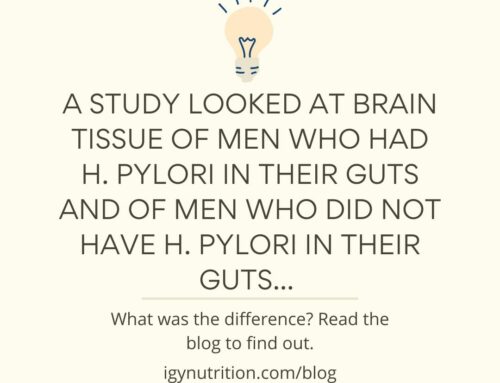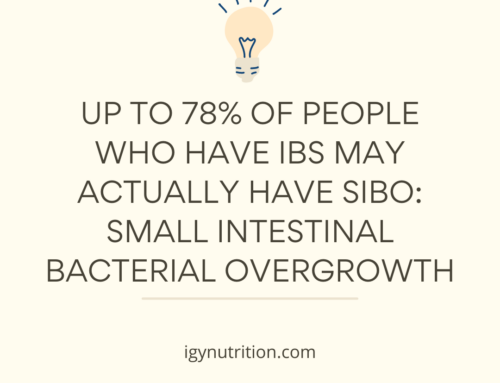The female menstrual cycle often comes to mind when thinking about hormone fluctuations. But a variation in a man’s hormones can also cause a rollercoaster of symptoms.
Several aspects of men’s health depend on sex hormones. Metabolic functioning, mood, digestion, and energy levels interact with men’s sex hormones.
So what’s gut health’s relationship to male hormones, and can we harness gut health as a tool to improve their levels? Today, we’ll look at testosterone in particular.
All About Testosterone
You’ve probably heard about testosterone. The public associates it with traditional “manly men” – think beards, muscle, and aggression. But that’s not entirely true.
Though men need more of it, testosterone is necessary for women’s health and fertility too. Testosterone promotes cell growth – on which both men and women rely.
Testosterone regulates:
- Bone density (1)
- Muscular development (2)
- Tendon/joint strength (3)
- Adrenal gland regulation (4)
- Libido and reproductive gland health (5)
- Motility (6)
- Much more
Without enough testosterone, a man may experience:
- Low libido or erectile dysfunction (5)
- Increased risk of osteoporosis and rheumatoid arthritis (3)
- Impaired muscle development (7)
- Poor joint strength (7)
- Depression (7)
- Low libido (7)
- Weight gain, primarily fat (7)
As you can see, having enough testosterone is crucial to male health. But having too much isn’t always a good thing.
Excess testosterone in men may cause:
- Low sperm count (8)
- Prostate enlargement (8)
- Insomnia (8)
- Increased appetite (8)
- Headaches (8)
- Cosmetic concerns such as acne (8)
- Mental health issues (8)
Having just the right amount of testosterone is key to a healthy body. Let’s take a look at how gut health impacts testosterone.
Gut Health and Testosterone
Scientific evidence asserts that gut health and testosterone production go hand in hand.
Males produce testosterone in the testes (8). Inflammation due to toxins produced by harmful bacteria – called lipopolysaccharides (LPS) – is thought to decrease men’s testosterone by damaging the testes. In theory, this would infringe upon men’s ability to produce testosterone adequately (9).
Several studies in mice exhibit that testosterone levels vary with gut microbiome composition. For example, mice that lacked a gut microbiome had lower testosterone levels (10). According to the researchers, the gut microbiome’s relationship to sex hormones such as testosterone clearly exists. We’ve included a few below so you can decide for yourself (10, 11, 12, 13, 14, 15).
The studies assert that an imbalanced microbiome impairs hormone production. Though we don’t know for sure which microbes support healthful testosterone regulation, for now, your best bet is to support your gut health anyway.
If you’re concerned about your hormone levels, reach out to an endocrinologist. In the meantime, work on those gut bugs!
Tag us in photos of your digestive wellness journey on Instagram @igynutrition!
References
- Mohamad NV, Soelaiman IN, Chin KY. A concise review of testosterone and bone health. Clin Interv Aging. 2016;11:1317-1324. Published 2016 Sep 22. doi:10.2147/CIA.S115472 https://www.ncbi.nlm.nih.gov/pmc/articles/PMC5036835/
- Griggs RC, Kingston W, Jozefowicz RF, Herr BE, Forbes G, Halliday D. Effect of testosterone on muscle mass and muscle protein synthesis. J Appl Physiol (1985). 1989 Jan;66(1):498-503. doi: 10.1152/jappl.1989.66.1.498. PMID: 2917954. https://pubmed.ncbi.nlm.nih.gov/2917954/
- Pikwer M, Giwercman A, Bergström U, Nilsson JÅ, Jacobsson LT, Turesson C. Association between testosterone levels and risk of future rheumatoid arthritis in men: a population-based case-control study. Ann Rheum Dis. 2014 Mar;73(3):573-9. doi: 10.1136/annrheumdis-2012-202781. Epub 2013 Apr 3. PMID: 23553100. https://pubmed.ncbi.nlm.nih.gov/23553100/
- Polderman KH, Gooren LJ, van der Veen EA. Testosterone administration increases adrenal response to adrenocorticotrophin. Clin Endocrinol (Oxf). 1994 May;40(5):595-601. doi: 10.1111/j.1365-2265.1994.tb03010.x. PMID: 8013140. https://pubmed.ncbi.nlm.nih.gov/8013140/
- Rastrelli G, Corona G, Maggi M. Testosterone and sexual function in men. Maturitas. 2018 Jun;112:46-52. doi: 10.1016/j.maturitas.2018.04.004. Epub 2018 Apr 6. PMID: 29704917. https://pubmed.ncbi.nlm.nih.gov/29704917/
- Hou, Xiaohua. “Interaction among hormones or peptides may be involved in gastric motor physiology.” Journal of neurogastroenterology and motility vol. 18,4 (2012): 353-4. doi:10.5056/jnm.2012.18.4.353 https://www.ncbi.nlm.nih.gov/pmc/articles/PMC3479246/
- https://my.clevelandclinic.org/health/diseases/15603-low-testosterone-male-hypogonadism
- https://www.health.harvard.edu/medications/testosterone–what-it-does-and-doesnt-do
- Tremellen, Kelton. “Gut Endotoxin Leading to a Decline IN Gonadal function (GELDING) – a novel theory for the development of late onset hypogonadism in obese men.” Basic and clinical andrology vol. 26 7. 22 Jun. 2016, doi:10.1186/s12610-016-0034-7 https://www.ncbi.nlm.nih.gov/pmc/articles/PMC4918028/
- He, Song et al. “The Gut Microbiome and Sex Hormone-Related Diseases.” Frontiers in microbiology vol. 12 711137. 28 Sep. 2021, doi:10.3389/fmicb.2021.711137 https://www.ncbi.nlm.nih.gov/pmc/articles/PMC8506209/
- Zhang F, Ma T, Cui P, Tamadon A, He S, Huo C, Yierfulati G, Xu X, Hu W, Li X, Shao LR, Guo H, Feng Y, Xu C. Diversity of the Gut Microbiota in Dihydrotestosterone-Induced PCOS Rats and the Pharmacologic Effects of Diane-35, Probiotics, and Berberine. Front Microbiol. 2019 Feb 8;10:175. doi: 10.3389/fmicb.2019.00175. PMID: 30800111; PMCID: PMC6375883.
- Org E., Mehrabian M., Parks B. W., Shipkova P., Liu X., Drake T. A., et al. . (2016). Sex differences and hormonal effects on gut microbiota composition in mice. Gut Microbes 7, 313–322. doi: 10.1080/19490976.2016.1203502,
- Harada N. (2018). Role of androgens in energy metabolism affecting on body composition, metabolic syndrome, type 2 diabetes, cardiovascular disease, and longevity: lessons from a meta-analysis and rodent studies. Biosci. Biotechnol. Biochem. 82, 1667–1682. doi: 10.1080/09168451.2018.1490172,
- Collden H., Landin A., Wallenius V., Elebring E., Fandriks L., Nilsson M. E., et al. . (2019). The gut microbiota is a major regulator of androgen metabolism in intestinal contents. Am. J. Physiol. Endocrinol. Metab. 317, E1182–E1192. doi: 10.1152/ajpendo.00338.2019,
- Markle J. G., Frank D. N., Mortin-Toth S., Robertson C. E., Feazel L. M., Rolle-Kampczyk U., et al. . (2013). Sex differences in the gut microbiome drive hormone-dependent regulation of autoimmunity. Science 339, 1084–1088. doi: 10.1126/science.1233521,




